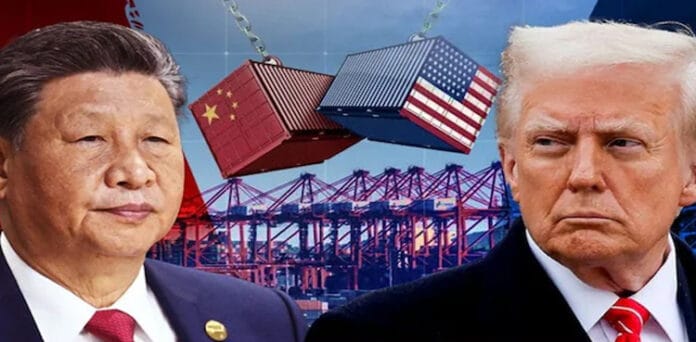Trump’s New Tariffs on Chinese Goods Reach 104%, Escalating Global Trade Tensions

The latest wave of U.S. tariffs, including a significant 104% levy on Chinese imports, took effect on Wednesday, further escalating the global trade war and heightening economic uncertainty worldwide. These new tariffs, which have been imposed on a range of products from multiple trading partners, have intensified tensions, particularly between the U.S. and China, the world’s two largest economies.
Tariff Details and Impact on China
The most notable of these tariffs is the 104% duty on Chinese goods, marking a dramatic increase from earlier rates. Since President Donald Trump’s return to the White House, tariffs on Chinese imports have grown substantially, now culminating in this staggering figure. This development places a heavy burden on China, Washington’s primary economic rival and a major trading partner.
In response to this, Beijing has vowed to retaliate and is expected to impose its own set of tariffs, further aggravating the trade conflict. China’s planned 34% retaliatory tariffs on U.S. goods are scheduled to come into force on Thursday.
Trump’s Strategy and Global Economic Reactions
President Trump has consistently maintained that these tariffs are a strategic move to revive U.S. manufacturing by encouraging companies to relocate to the United States. However, many economists and business experts remain skeptical about the effectiveness of this approach, citing the potential for higher inflation as tariffs raise the cost of imported goods.
Trump also emphasized that the U.S. is in the process of negotiating “tailored deals” with key trading partners such as Japan and South Korea, with the aim of reducing tariffs for countries that align closely with U.S. economic interests. Additionally, countries like Argentina, Vietnam, and Israel have expressed interest in reducing tariffs to foster better trade relations with the U.S.
Financial Markets React to Tariff Increases
The implementation of these tariffs has caused significant disruption in global financial markets. Asian stock markets opened lower on Wednesday, with Hong Kong and Japan’s Nikkei experiencing sharp declines. The South Korean won reached its lowest value against the U.S. dollar since 2009, while China’s offshore yuan also fell to a record low. Meanwhile, oil prices dropped below $60 per barrel for the first time since April 2021.
These market declines reflect the broader impact of the escalating trade conflict, with investors uncertain about the long-term effects on global trade and economic stability.
The European Union’s Position and the Global Outlook
As the U.S. and China continue to clash, the European Union (EU) has called for a de-escalation of the trade conflict. EU leaders, including Commission President Ursula von der Leyen, have urged both sides to avoid further escalation to preserve global economic stability. In a call with Chinese Premier Li Qiang, von der Leyen stressed the importance of maintaining calm during this tense period.
In retaliation against U.S. tariffs on steel and aluminum, the EU is preparing to impose its own set of duties, ranging from 20% to 25% on American goods, including agricultural products like soybeans and motorcycles.
Looking Ahead: The Future of U.S.-China Relations
Despite the mounting tensions, President Trump remains firm in his belief that China is eager to reach a deal. He has repeatedly stated that Beijing “wants to make a deal badly” but has struggled to find a starting point for negotiations. However, as the trade war continues to deepen, the path to an agreement remains uncertain, and both global markets and political analysts are closely monitoring the situation.
In a surprising development, Trump also mentioned that a significant tariff on pharmaceuticals could be announced in the near future, signaling that the trade conflict may extend beyond industrial goods and into other sectors of the economy.
The outcome of these ongoing tariff battles remains to be seen, but the implications for global trade, economic stability, and diplomatic relations are profound. As both the U.S. and China prepare for further action, the world will continue to grapple with the consequences of this unprecedented economic confrontation.




